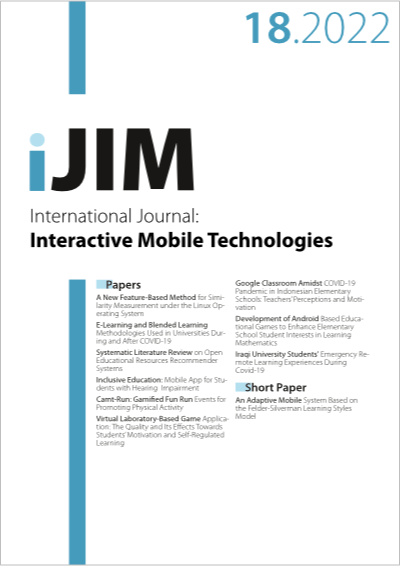Virtual Laboratory-Based Game Application: The Quality and Its Effects Towards Students’ Motivation and Self-Regulated Learning
DOI:
https://doi.org/10.3991/ijim.v16i18.32875Keywords:
mobile learning, motivation, self-regulated learning, virtual laboratoryAbstract
Considering that students have a lot of experiences using mobile applications in their daily life, teacher should engage mobile application as learning media, thus the student are more motivated to learn independently. As a consequence, the teachers should implement existing mobile learning in the learning process and it is even better if they can develop it themselves. Besides, developing mobile learning is being heavy burden for a teacher as they still lack of skills to design and to develop mobile learning. Therefore, we aimed to explore the quality of Amazing Science application as mobile learning incorporated with a virtual laboratory based game application and to investigate its effect on students’ motivation and self-regulated learning. This research involved 5 sciences teachers and 50 students from five secondary schools in Yogyakarta, Indonesia. The research data were collected through online questionnaires consisting of three instruments, namely; viz product quality questionnaire for product validation, motivation questionnaires and self-regulated questionnaires for product implementation. Product validation data are quality data in the form of categories, so they are converted to data score using the Likert scale. Meanwhile, implementation data consisting of motivation and self-regulated learning data were analyzed with a sample paired t-test to discover the effect of product implementation towards motivation and self-regulated learning. The result revealed that Amazing Science application has a good quality according to the reviewers and students through a preliminary test and limited trial. Moreover, there are significant differences in both students’ motivation and self-regulated learning before and after the implementation of Amazing Science. However, there is no significant correlation between students’ motivation and self-regulated learning. From the findings, it can suggest that Amazing Science should be implemented by combining with the cooperative learning model, so others' skills can be improved. Besides, it can rebuild on another learning material or subject
Downloads
Published
How to Cite
Issue
Section
License
Copyright (c) 2022 Suyanta, Jumadi, Insih Wiludjeng, Ilyas Md Isa, Rosly Jafaar, Anggi Ristiyana Puspita Sari, Sri Rejeki Dwi Astuti, Rahadian Zainul

This work is licensed under a Creative Commons Attribution 4.0 International License.



